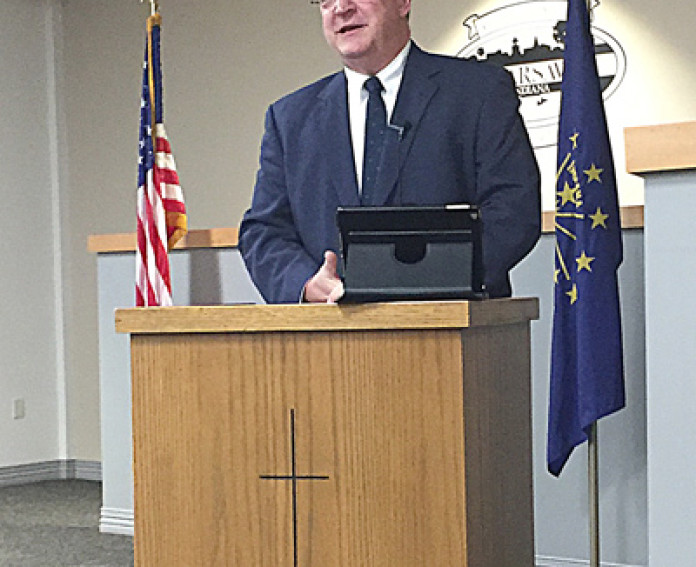Accusations of behind-the-scenes decision making by city officials involving a downtown alley enhancement project were aired Monday night at the Warsaw City Council meeting.
The claims were based on a series of email conversations obtained by a city resident through a Freedom Of Information Act request.
Copies of the emails were provided to the media by Chad Zartman. The accusations appeared to catch city officials off guard at the end of Monday’s meeting.
The emails show an on-going conversation between the assistant city planner, Justin Taylor, and Josh Boren, owner of Boren Builders, of Winona Lake, beginning with the early stages of the alley project as they worked to whittle down the cost of materials to get it under $50,000 – a move that would allow the city to avoid putting the project out to bid and thus open the door for other contractors to seek the work.
Other emails appear to show members of the Warsaw Board of Works agreeing to support the final cost of materials before a public meeting in which they voted on the issue.
Another series of emails appears to show board members signing off on a grant application before board approval.
“These things were not only voted through email, they’re acted upon … so the Board of Works meetings – for these items in particular – is nothing more than a charade because the decision has already been made,” Zartman said.
Zartman said they’ve filed complaints over the issues with the Indiana State Board of Accounts and the Indiana Public Access Counselor who oversees issues of governmental transparency.
While Public Accesss Counselor Luke Britt has not issued a final opinion on the use of the city emails, Zartman said a preliminary assessment by Britt of the city’s attempt of seeking approval of a plan via email are prohibited and should only happen at a public meeting. “This is a definite violation of the law and does nothing but to erode the public trust,” Britt said in an email, according to Zartman.
Zartman questioned how often the city makes decisions in that manner.
Mayor Joe Thallemer and City Attorney Mike Valentine reacted tersely after Zartman made his claims. Thallemer said he would like to review the information before commenting.
Thallemer said he felt blindsided by the accusations.
Thallemer said the city turned over a large stack of copies of documents that were sought in the request. He said he did not review the paperwork before providing them to Zartman.
Valentine said Zartman’s assessment in public was akin to playing “judge, jury and executioner.”
On Tuesday morning, after consulting with staff and at least one state agency, Thallemer said he believed the city did nothing improper.
Thallemer said board approval of the purchase of materials was not necessarily required because it is under $50,000 and that the emails to the board were an attempt to keep the board abreast of what was happening.
“I don’t think we did anything wrong,” Thallemer said. “I want to get clarification from the public access counselor when we have timing issues that fall in between Board of Works (about) what our options are.”
“I want to clarify what our options are,” he said.
Thallemer points out that the city chose to seek a contractor who would only provide labor while the city went ahead and purchased all the materials, a move he said the city often does to cut costs.
In an email with Boren in February, the company suggested labor would be around $65,000. Thallemer said that estimate was a starting point based on a rough idea of what the project would entail. Reducing the costs to be under $50,000 was within the city’s statutory authority, he said.
The $50,000 threshold was established by the city through an ordinance and could be much higher if the city chose to adjust the policy, he said.
Thallemer said they chose Boren for the project based on a recommendation from a vendor and the fact that Boren had time to do the project.
As for the board’s email sign-off on the grant application, the city was under a time constraint to submit the application, Thallemer said.
In both instances, the moves were made as the city worked to begin the project in the spring so that the alley improvements could take shape this summer.
The board consists of Thallemer, Jeff Gross and George Clemens.
The alley project is expected to cost slightly over $100,000 and was funded through private donations and a matching grant from the state.
Much of the improvements to the half block-long stretch of alley between city hall and two businesses to the south have already been implemented. It will include, among other things, tables, chairs, lights, a decorative paving pattern and planters.
Britt could not be reached for comment early Tuesday.
Zartman describes himself as a landlord who became upset with the city over last year’s change in the trash collection policy who then began watching city council activities.
He and Kyle Babcock, a former city councilman who initially questioned how the city was handling aspects of the alley fundraising, both attended Monday’s meeting and provided members of the media with copies of the emails.
Babcock, who did not speak at the meeting, first raised concerns about anonymous donations for the alley project in early June and questioned why the city was not releasing the names of those supporters.





